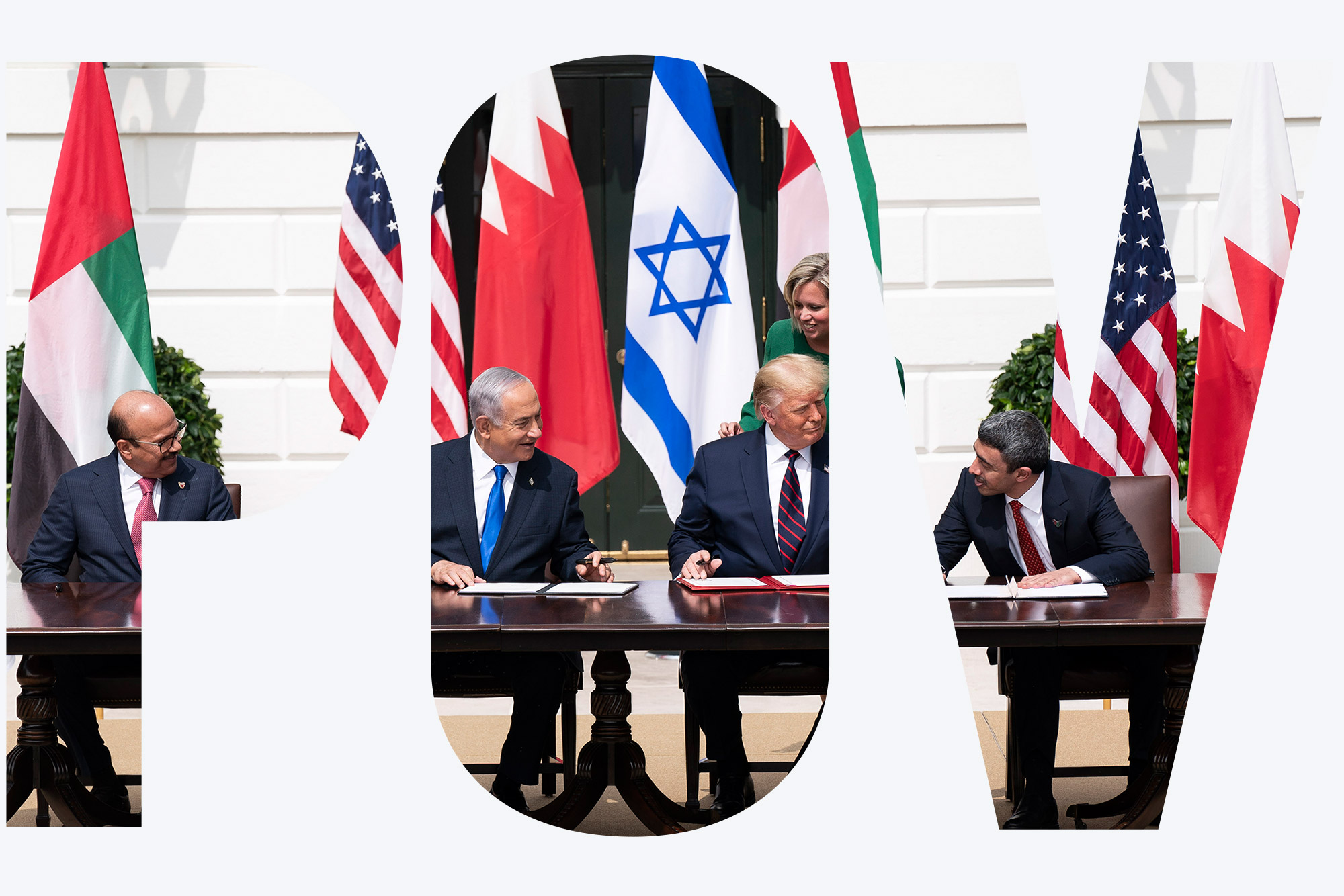POV: Winners and Losers in the Israel-UAE Normalization Pact

Photo by Shealah Craighead/Official White House Photo
POV: Winners and Losers in the Israel-UAE Normalization Pact
Pardee professor of diplomacy weighs the significance of President Trump’s Middle East agreement
The normalization agreement between Israel and the United Arab Emirates announced by President Trump in mid-August and formalized at the White House on September 15 is a Middle East milestone. For just about everyone except the Iranians and the Palestinians, this is a very positive—if overdue—step. So, who are the winners and who are the losers in this agreement?
Winner: Israel Prime Minister Benjamin Netanyahu. For Netanyahu, the agreement is a fillip to his political standing as he faces corruption charges. The deal will cost him among hard-line Israeli settlers, but a strengthened backing across the Israeli political spectrum will more than compensate. Netanyahu has thrown himself a political lifeline. Israel will gain greater access to the Middle East’s financial centers and continue to work toward more normal relations with its neighbors.
Winner: Mohammed bin Zayed (MBZ), Crown Prince of Abu Dhabi. For MBZ, the move and the relative quiescent response from other Arab states expands his maverick leadership in the Arab world. He and his Bahraini counterpart demurred from traveling to the White House to keep some public distance from President Trump. And the United Arab Emirates (UAE) access to America’s most advanced fighter, the F-35, is not yet assured. But the UAE and MBZ have cemented a privileged position with Washington. It is unclear whether this will translate into more latitude for the UAE in its repressive domestic policies, its opposition to the Muslim Brotherhood, or its military adventures.
Winner: President Trump and Jared Kushner. For a president behind in the polls less than two months before national elections, the accord constitutes a welcome foreign policy success for an administration otherwise bereft of much to crow about in international affairs. Although the normalization agreement largely formalizes a process underway for over a decade, Trump and Kushner deserve credit for pushing the courtship to conclusion. Ironically, the US pullback from the region was likely a driving force bringing Middle East partners together. With the US role in the region less sure, all sides are looking for other allies.
Winner: Saudi Arabia. Saudi Arabia and Saudi Crown Prince Mohammed bin Salman (MBS) are likely relieved to have strengthened the tacit alliance between Sunni Arab countries and Israel. MBS may have lost some heft in the region relative to MBZ, but any slip in Saudi standing is likely outweighed by economic and security opportunities the accord represents.
For a president behind in the polls less than two months before national elections, the accord constitutes a welcome foreign policy success.
Winner: Generational change. For 70 years, Arab states reflexively rallied around the Palestinian cause. That support has seemed increasingly hollow lately, as Arab leaders have tired of unresolved Palestinian grievances and feckless Palestinian leadership. But the old guard in the region still instinctively supports the Palestinians, even if largely rhetorically. The UAE move and Saudi Arabia’s acquiescence highlight generational change in the Arab world. Younger leaders like MBZ and MBS are focused on other issues. The normalization accord signals a generational shift that may portend greater flexibility on a whole series of issues.
Loser: Palestinians. The Palestinians are the biggest losers, and some feel outright betrayed by their Arab brethren. The UAE won Netanyahu’s pledge to “suspend” annexation of parts of the West Bank. But this seems largely a fig leaf since annexation is clearly on hold, not canceled. Palestinians will need to accommodate to their increasing isolation. The ineffective and divided Palestinian Authority has already seen its legitimacy eroded over the years. It is unclear if they are even in a position to bargain effectively on behalf of their people. As a result, normal Palestinians may have lost more than even their titular representatives.
Winner or Loser? Too early to say: Iran and Middle East Peace. Tehran is still licking its wounds from the killing of Quds Force commander Qasem Soleimani and reeling under economic damage from Washington’s “maximum pressure” campaign and Israeli cyber operations. Normalization between Israel, the UAE, and Bahrain solidifies a US-Israel-Sunni Arab axis in the region—especially if some other Sunni Arab states follow suit. The big unknown is how Iran and its many toxic proxies will react. If Tehran feels chastened and decides to keep its powder dry for now, there may be opportunities to consolidate stability in the region. If Iran feels compelled to strike out, especially by advancing its nuclear program, all bets will be off.
Winner or Loser? Too early to say: Multilateral Diplomacy. Sterile posturing by Arab and Islamic countries determined to demonstrate their hostility to Israel wastes considerable time and energy in virtually every multilateral forum. If, by chance, these latest moves presage more constructive approaches by Arab and Islamic states in multilateral fora, who knows? Perhaps the United Nations and its many bodies could become more effective in the future.
Comments & Discussion
Boston University moderates comments to facilitate an informed, substantive, civil conversation. Abusive, profane, self-promotional, misleading, incoherent or off-topic comments will be rejected. Moderators are staffed during regular business hours (EST) and can only accept comments written in English. Statistics or facts must include a citation or a link to the citation.